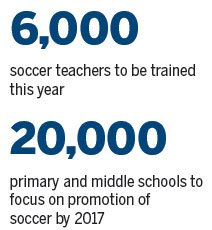Leading reform group calls for an innovative approach and says obstacles must be tackled
The goal of turning China into a soccer power has moved closer to being realized, with a top-level policymaking team approving a comprehensive reform plan to boost the sport from playgrounds to stadiums.

A meeting of the nation's Leading Group for Overall Reform headed by President and Party chief Xi Jinping decided on Friday that institutional flaws hindering soccer's development must be tackled.
The meeting highlighted the need for an innovative approach and a combining of the state-run system with market forces.
It also called for increased public involvement and diversified training channels, including campus soccer and professional clubs to develop young players and hone their skills.
Zhang Qing, founder of sports marketing agency Key-Solution, said the blueprint rolled out by the top leadership will mobilize society to develop soccer and enable it to achieve breakthroughs in China's sports and education reform.
The reform group, set up in December 2013, usually focuses on economic issues, with initiatives unveiled at its meetings widely taken as reference points to future development.
Specific measures the government will take remain unclear, but the plan comes amid increased efforts to develop sports, most notably soccer, since Xi took office two years ago.
An avid soccer fan, Xi has made no secret of his determination to improve the sport's image, which has been tarnished by scandals and poor administration. The national team has fared poorly on the global stage, with only one World Cup finals appearance, in 2002.
Zhang said the issues that need to be addressed include society acknowledging sports as a part of life and education, and reforms to meet soaring public demand for sports.
For instance, primary and middle schools used to generally ignore soccer, Zhang said, adding that the country's professional soccer league is not meeting its potential and the development of soccer among the public lags far behind developed countries.
China has increased efforts to address such problems, but it will be a long-term task, he added.
Minister of Education Yuan Guiren said in November that soccer will become a compulsory part of physical education classes.
The ministry also set a target for establishing more soccer academies, aiming to train up to 6,000 soccer teachers this year and having about 20,000 primary and middle schools focusing on promotion of the sport by 2017.
A market-oriented operation has been encouraged by the 2013 AFC Champions League winner Guangzhou Evergrande, which was taken over by real estate company Evergrande in 2010.
Contact the writers at [email protected]